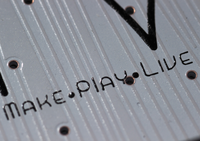Vivaldi Meets Don Quixote
How do you approach an open hardware project? We look at Aaron Seigo's projects Vivaldi and Improv as examples and discover how hard it really is to manage a truly free hardware project.
|

MAKE*PLAY*LIVE
How do you approach an open hardware project? We look at Aaron Seigo's projects Vivaldi and Improv as examples and discover how hard it really is to manage a truly free hardware project.
Our story starts about two years ago when KDE Plasma developer Aaron Seigo [1] was looking for a way to earn a living. He had been employed by the Trolltech company for KDE development. Then, Trolltech went to Nokia, which in turn sold the Qt framework to Digia.
Shortly thereafter, Seigo (Figure 1) announced a new tablet design based on his and his colleague's specifications. The hardware, based on Zenithink C71 [2], was to be produced in Southeast Asia, with the developers planning heavily on components for which there were free drivers.
The tablet should run Linux in the form of the Mer [3] distribution, a derivative of Meeego, which, in turn, derived from Maemo and Moblin. The user interface should provide KDE Plasma Active [4], a joint project of KDE, OpenSLX [5] and the basysKom [6] company. Plasma Active aimed for a user-friendly interface for mobile platforms with low demands on hardware.
[...]
Pages: 3
KDE Plasma Activities remove the limitations of having a single desktop and allow you to have multiple environments with their own sets of launchers for applications, files, and URLs, each customized for a single purpose.
Opera changed course with version 15, giving up its status as independent software and dropping many of its features. Vivaldi seeks to offer a new home to fans of the old Opera.
Most of the large web browsers focus on speed. Vivaldi puts its energy into lots of nifty features and an elegant interface. The program offers things like gestures and keyboard control, tab tiling, and saving notes.
© 2025 Linux New Media USA, LLC – Legal Notice